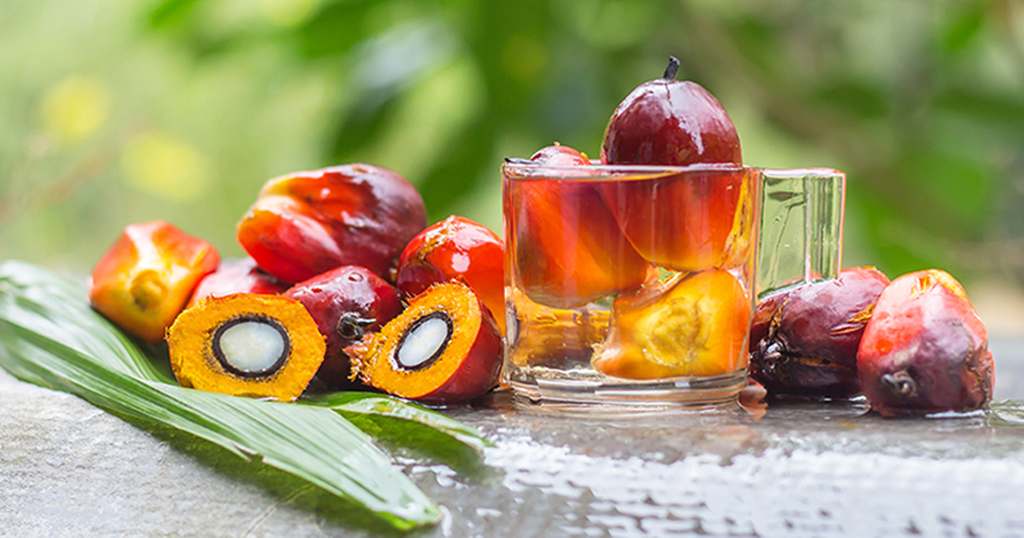Malaysian Palm Oil – the Natural Choise
Palm oil has long been recognized as edible oil, whose trees are native to West Africa. The oil palm tree yields two very diffrent oils itself. Palm oil comes specifically from the soft flesh of the palm fruit, called the mesocarp. Much like the olives, the oil palm fruits are pressed to extract the precious oils. The other oil palm tree produces is from the seed of the fruit and is called palm kernel oil.
Palm oil is a vegetable oil, and more specifically fruit oil. As such, like vegetable oils, it has no cholesterol. Moreover, palm oil has rather unique chemical profile in that it possesses a near-equal balance of saturated and unsaturated fatty acids. Unlike other tropical oils, whose saturated fatty acids can comprise over 90% of the oil, palm oil has 50% unsaturated fatty acids. Owing to this composition, clinical studies have shown that palm oil tends to be “net neutral in terms of effect on a person’s cholesterol levels.”
Palm oil is naturally very high in carotenoids, organic pigments that occur naturally in fruits and vegetables. It has beern well-documented that people with diets naturally rich in carotenoids are healthier and more resistant to chronic illness. Unrefined palm oil in particular (which is orange-red in color) is a powerful source pf carotenoids – 15 times more than carrots and 30 times more than tomatoes. Thus this power-packed oil is easy to spot on the shelf, owing to its deep orange color, and is called Red Palm Oil.
Even when refined, the unique manner in which crude palm oil is processed ensures that its naturally high levels of various forms of vitamin E are retained. In particular, palm oil among nature’s richest tocotrienols, which are members of the vitamin E family, and tocotrienols are a powerful antioxidant. These antioxidants have a number of beneficial health attributes, including lower blood cholesterol levels, prevention of plaque formation inside arterial walls, and inhibition of the growth and spread of breast cancer cells.
With palm oil’s unique natural semi-solid composition and doesnt’t require hydrogenation to achieve a solidified oil products, palm oil is remains completely Trans Fatty Acids free (TFA-free).
Apart from its scientifically proven helath attributes, palm oil is an excellent for frying and cooking. It has excellent stability, long shelf life, can withstand heat and resist oxidation well, and has a mild, neutral flavor, which enables it to be used on its own or blended perfectly with other oils. Due its comparatively low cost, palm oil is today perhaps the most widely used frying oil in the world.
Since oil palms are tropical trees, they’re grown almost exclusively in countries in that zone, which makes Malaysia to be highly suitable to plant oil palm trees. The oil palm was introduced to Malaysia in the late 1800s by the British. This star commodity of Malaysia has now made the country as among the world’s leaders in production and exports of palm oil.
Year 2011 had been good for the Malaysian palm oil industry with record high in key performance indicators especially crude palm oil (CPO) production and exports volume. CPO production in Malaysia for 2011 has increased by 11.3% to reach a record high of 18.91 million metric tonnes (MT). While on the other hand, total exports of palm oil rose by 8.0% to 18.00 millon MT in 2011 as against 16.66 million MT in the previous year. The increase in palm oil export was mainly due to higher export volume to China, India, the Philippines, Vietnam, South Africa and Turkey. Exports of palm oil to Turkey rose by 6 folds to 0.11 million MT due to high intake for food manufacturing companies with exports destined for local markets as well as Middle Eastern markets, mainly to Iran and Afghanistan.
Malaysian Palm Oil Council (MPOC) is instrumental in promoting Malaysian palm oil to Turkish market especially liquid palm oil industrial –scale frying as well as margarine for industrial and consumer packed products. After the establishment of its regional office in Istanbul in year 2009, the export to Turkey has shown a stellar performance year by year.
Malaysian Palm Oil Council (MPOC) is the promotional agency under the Ministry of Plantation Industries and Commmodities of Malaysia, with a mission to promote the market expansion of Malaysian palm oil and its products by enhancing the image of palm oil and creating better acceptance of palm oil through awareness of various technolocigal anc aconomic advantages and enviromental sustainability.
In delivering its services to the stakeholders and to the global masses, MPOC’s ten regional offices worldwide turn out to be reference point for the industry. The programs and activities that are featured under MPOC’s approach are encompassing the absolute necessary and practical methods in reaching its objectives.
With objectives to enhance trade opportunities in the market place, MPOC has continued yo enhance trade opportunities by identifying and meeting the latest opportunities in the market. The programs and activities organized by MPOC were properly planned which aim to improve understanding of palm oil and eventually encourage product diversification by using Malaysian palm oil as the key ingredients. MPOC’s programs are highly geared towards meeting and exceeding the expectations of the industry players. The level of customer commitment can be seen in MPOC’s output in terms of its successful programs and positive feedbacks from the industry.











Leave a Reply